In this article, all methods of organic control that can be used in the container garden will be discussed. Not all of us like to use synthetic chemicals to control pests and diseases, as some prefer the more natural approach. This may result in lower quality crops or not so many colourful blooms, but it is the way nature has attended.
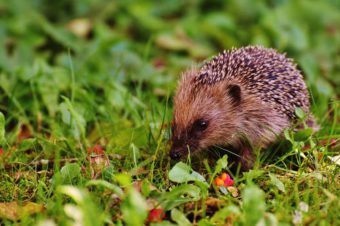
This is known as organic gardening. Some people seem to spray indiscriminately and this can upset the natural ecosystem that forms in the garden. You may be trying to kill a foe but instead up killing a friend. If you kill a friend, what will happen is competition is reduced, pests bred faster, resulting in heavier infestations than before and much more damage.
The preferred organic way is to rely on attracting predators of the known pests by planting a wide diversity of species in your container garden. If this is followed and you use good husbandry, you produce strong, healthy plants that have the best chance of withstanding assaults made by those little beasties. Not only producing healthy plants is important but good hygiene should be practice also.
PRACTICE GOOD GARDEN HUSBANDRY
This involves removing any rubbish that lies around the garden, that any thinnings for vegetables are confined to the compost heap and that you remove and destroy diseased plant material as soon as you see the first signs of attack.
One of the simplest and often the best way of controlling onslaughts from pests is to simply pick the little blighters off the plant before large population have the chance to build up.
This can be coupled with careful selection of plant varieties and some physical control and natural deterrents against the pests.
The methods do work and most modern insecticides and fungicides are directed towards improving existing ways of using organic principles. This includes more targets insecticide that targets pests and not the friendly species and a vast reduction in the number of fungicides that are available to the home gardener.
The problem is that if you have been spraying your garden with inorganic chemicals, do not expect the friendly insects to come flooding back into your garden to start dealing with the pests. They will not appear as by magic.
It will take a least a couple of years to build a balance of wildlife in the garden; in that time your plants will certainly suffer and generally not look their best. This is where you have to practice patience and try to control your urge to spray everything. If you do, it will sort itself out at the end, as everything in life generally does.
However, if you have a period of madness and return to inorganic chemicals just once, you will be back at square one and will need to start all over again.
The following can be used in your garden that follows the best organic principles
HOVERFLIES
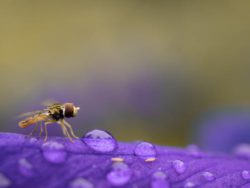
Some of these insect predators can be encouraged into the garden by the use of suitable plants. Hoverflies need a feed of pollen before they lay their eggs.
Since they have a short feeding tube-they look for open structured flowers like that of Limnanthes dougalsii (Poached Eggplant). Once these insects have been fed, the female lay eggs amongst colonies of aphids, where the resulting larvae can eat up to 100 greenflies a day.
FROGS AND TOADS
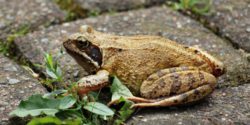
These tend to feed on slugs in particular and once they breed in your garden, they will come back year after year. This is why it is a good idea to have a pond or some sort of wildlife water feature and provide them with plenty of water needs, especially when they are in the young stages.
Toads’ live for a long time and breed very freely, so it is not difficult to build large colonies very quickly. The old Victorian gardeners used to keep a toad or two in the greenhouse as a means of controlling slugs and flies.
BIRDS
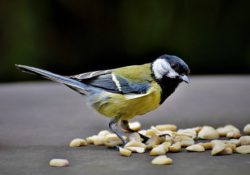
In a previous article, I have discussed various ways of attracting bird to the garden, where they will benefit it no end, in term of the good they do and the beauty they bring. These birds eat slugs, snails, caterpillars, aphids and other pests too. They must be encouraged to do this. Do this by providing a water source (not only good for toads and frogs), provide places for them to perch, nesting boxes and particularly winter plants that can provide foods for them. Plants like shrubs and trees that produce colourful berries and a feast for the birds.
HEDGEHOGS
Although they are in decline, you can sometimes encourage them to stay in your garden, if you make a pile of logs that will provide a home for them. You may do all the hard work, but they are naturally nomadic. Here one day, gone the next. You can try to persuade them to stay by offering dog food to feast on and then they will be more interested in hanging around. It is problematic as this will stop them from feeding on the slugs in the garden. This rather defeats the object as you need food to attract them and then they will ignore the slugs you want to get rid-off.
GROUND BEETLES
Various sorts of ground beetles are great allies to the gardeners and if you see one, so not kill them. They devour slugs and in particular caterpillars where their main activity of feeding happens during the night. During the day, they need to hide from their main predators-the birds. If you do not want this to happen, you must offer plenty of ground cover on the form of plant or pieces of wood or sticks under which they can conceal themselves. An insect hotel in winter is ideal for them
OTHER INSECTS
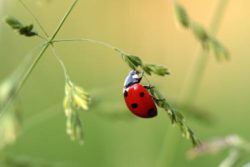
Various insects like ladybirds and lacewings will eat aphids buy the bucketload but there is no specific plant that will attract them into the garden, They seem to breed where the aphid infestation is at the worse. They will simply feed you and there is nothing you can do to attract them. Just provide a good selection of plants and they will naturally follow.
PHYSICAL BARRIERS
By placing a barrier to the pest, you can stop them causing damage to your crops. Barriers have been developed to cover crops without significantly raising the temperature in summer. All wing insects cannot get in and crops like parsnips, carrots, celery, celeriac and brassicas can be grown under protection from the carrot fly, cabbage root fly and caterpillars.

Floating cloches are another form of protection against winged insects and they can be used without hoops to lift them above the crops. There use is limited as they have to be removed from the crop as it matures.
Netting can be used to stop birds from eating all of your soft fruit or the young leaves of your brassicas. It is important to stretch netting lightly over plants to prevent birds getting caught within.
RESISTANT PLANT VARIETIES
Plant breeders are continuously developing plants that are pest and disease resistant. So it is worthwhile checking up on the latest varieties of fruits, vegetables and ornamentals that show some resistance, especially to bacterial, viral and fungal diseases.
A prime example is roses, who tend to suffer from blackspot and mildew. Some suffer from these diseases very badly, whilst others are virtually free of both diseases. You may be more limited in your choice but then you will save money in buying stock will not need to be thrown away.
CONCLUSIONS
In this article, we have discovered some of the best methods of using organic principles to control pests and diseases in the container garden.
As you can see many natural predators can be used, anything from hoverflies, frogs, toads, birds, hedgehogs, ground beetle, lacewing, ladybirds, physical barriers and the use of resistant plant varieties can all be used.
It may not work at first, but as a natural ecosystem develops in your garden, your pest and diseases will be naturally controlled. If you follow what is recommended, you will soon be reaping great harvests and have stunning flowers in your garden; a thriving home for the friendly predators to live in.
If you have any questions or comments that you wish to raise, please do so in the comment box below.
Make your garden inviting for friendly predators.

Thank you for your post. It is a timely article for us. My and I are working on our garden now. We would like to grow everything organically. We think about organic control in the garden, but never take time to do the research.
Here comes your article, which has a lot of useful info for us. I particularly like your description on Practice Good Garden Husbandry. I understand that it will take us a couple of years to build a balance of wild life in the garden. With this in mind, we will have good plan and practice patience, never spray the garden, and never use inorganic chemicals in the garden.
The best organic principles are very good guidelines for my garden work.
Hi Anthony
If you want to go organically, it is difficult not to go for organic sprays but you will be glad that you did not. Your garden may look unsightly but in the future, it has the right ecosystem. If you attract the predators then you will not be inundated with pests.
Thank you for your visit.
Antonio
Greetings again. I have been here before and will surely return. I have a question regarding your opinion on commercially purchased mesh bags of lady bugs as an organic pest control method. I tried releasing bags of ladybugs without remarkable success. As it seems, most of the ladybugs either died or just left the garden. Do you have any insight on this? Thank you.
Hi Knightstone
Thank you for once again stopping by and comments. I do hope that you have learnt something from the article and that you start applying it to your garden. You will not regret it. To answer your question; it is okay to use ladybirds in the mesh as a means of controlling aphids, but it is not a foolproof method, as they do not often stay where you place them or as you say they can die. In an outside environment, you can forget it, but in a greenhouse, this is another thing entirely, as long as you have aphids and do not let them escape, it should work.
Thank you
Antonio
Wow, what a lot of information and quite useful, too. We use only organic growing methods and find that while it might take more effort and sometimes produce less end product (for our fruits and vegetables) the end result is well worth it.
I like that you mention the value of using toads, frogs, birds, etc. We also release ladybugs and other beneficial insects to help on our farm. It just makes sense to utilize these “free workers” whenever we can!
I’ll be sharing this article with others as I believe you have quite a bit of needed information.
Hi Diane
It is great to use organic principles in the garden, as you know that you are not harming the planet or wildlife if you undertake it. This is why I have discussed all the ways of attracting wildlife into your garden, as they can act on the natural pests that are waiting there. I am glad you enjoyed the article and hope you take a lot from it.
Kind regards
Antonio
Thank you for writing on methods of organic control in the container garden . In order to get better information and guidance can be taken from this blog specifically. It plays a vital role in taking us through. It can be really great for people like me who are looking for grabbing more knowledge about.
Hi Bed Bugs
I am glad you enjoyed the article and you got a lot out of it. It is easy to apply to apply without having to rely on harsh chemicals.
Thanks
Antonio